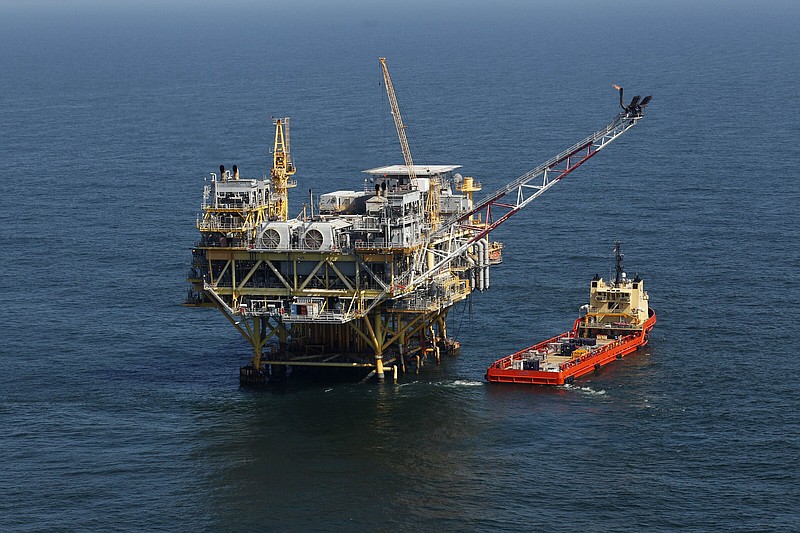WASHINGTON -- President Joe Biden's administration on Friday proposed up to three oil and gas lease sales in the Gulf of Mexico but none in Alaska as it tries to navigate between energy companies seeking greater oil and gas production and environmental activists who want Biden to shut down new offshore drilling in the fight against climate change.
The five-year plan includes proposed sales in the Gulf of Mexico, the nation's primary offshore source of oil and gas, in 2025, 2027 and 2029. The three lease sales are the minimum number the Democratic administration could legally offer if it wants to continue expanding offshore wind development.
Under the terms of a 2022 climate law, the government must offer at least 60 million acres of offshore oil and gas leases in any one-year period before it can offer offshore wind leases.
The provision tying offshore wind to oil and gas production was added by Democratic Sen. Joe Manchin of West Virginia, a top recipient of oil and gas donations and a key vote in favor of the climate law, which was approved with only Democratic votes in the House and the Senate. The landmark law, the Inflation Reduction Act, was signed by Biden as a key step to fight climate change but includes a number of provisions authored by Manchin, a centrist who represents an energy-producing state.
For instance, if the Biden administration wants to expand solar and wind power on public lands, it must offer new oil and gas leases first.
"The Biden-Harris administration is committed to building a clean energy future that ensures America's energy independence," Interior Secretary Deb Haaland said in a statement. The proposed offshore leasing program "represents the smallest number of oil and gas lease sales in history" and "sets a course for [the Interior Department] to support the growing offshore wind industry," she said.
The lease program will guard against environmental damage caused by oil and gas drilling and other adverse impacts to coastal communities, Haaland said.
Manchin on Friday sharply criticized the administration's announcement and said limiting oil and gas lease sales would result in fewer renewable energy leases under the terms of the climate law.
"You can't have one without the other," he said. "It makes no sense at all to actively be limiting our energy production."
Still, the plan allows drillers such as Chevron, BP and ExxonMobil to participate in as many as three oil and gas auctions over the next five years, a top priority for the industry that could lock in decades of offshore oil and gas production.
The plan goes against Biden's campaign promise to end new offshore drilling and could become a political liability for the Democratic president, who already faces sharp opposition from environmental groups angry at his decision earlier this year to approve ConocoPhillips' massive Willow oil project in Alaska.
ConocoPhillips Chief Executive Officer Ryan Lance called Willow "the right decision for Alaska and our nation." But environmental groups call the $8 billion project a "carbon bomb" that would betray Biden's pledge to cut planet-warming greenhouse gas emissions in half by 2030. Opponents mounted a #StopWillow campaign on social media that has been seen hundreds of millions of times.
Interior Deputy Secretary Tommy Beaudreau appeared to acknowledge the contradiction on Thursday, telling a Senate hearing that the administration's options were limited by the climate law.
"The [oil leasing] program is definitely informed by the [Inflation Reduction Act] and the connection that the [Inflation Reduction Act] makes between offshore oil and gas leasing and renewable energy leasing," he said.
The Interior Department can't sell the rights to drill for oil and gas offshore without first publishing a schedule that outlines its plans. The administration faced a deadline today to release the five-year plan.
Environmentalists said the decision to lease more oil reserves would worsen climate change impacts from oil and gas emissions and leave coastal communities exposed to spills that occur regularly in the Gulf of Mexico. Beth Lowell, with the group Oceana, said Biden was "showing the world that it's OK to prioritize polluters over real climate solutions."

